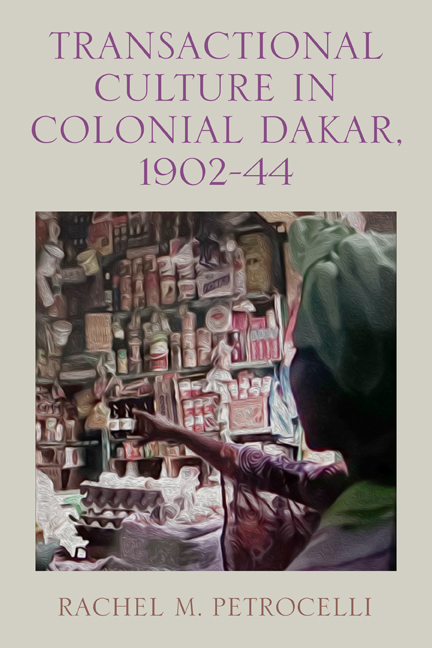Book contents
- Frontmatter
- Dedication
- Contents
- List of Illustrations
- Acknowledgments
- Introduction
- 1 Illusory Roots: Europeans, Autochthony, and Visions of a Capital City
- 2 The Rhetoric of Refoulement in Colonial Dakar
- 3 Challenges and Solutions of the Transient City
- 4 Impediments and Ingenuity in Financial Life
- 5 Ethnic Boundaries, Economic Niches, and Ambiguities in the Colonial City
- 6 The Lebanese and the Local in the Interwar Period
- 7 War’s Window: Urban Informality and Control
- Epilogue
- Bibliography
- Index
Introduction
Published online by Cambridge University Press: 08 May 2024
- Frontmatter
- Dedication
- Contents
- List of Illustrations
- Acknowledgments
- Introduction
- 1 Illusory Roots: Europeans, Autochthony, and Visions of a Capital City
- 2 The Rhetoric of Refoulement in Colonial Dakar
- 3 Challenges and Solutions of the Transient City
- 4 Impediments and Ingenuity in Financial Life
- 5 Ethnic Boundaries, Economic Niches, and Ambiguities in the Colonial City
- 6 The Lebanese and the Local in the Interwar Period
- 7 War’s Window: Urban Informality and Control
- Epilogue
- Bibliography
- Index
Summary
In 1922, the Tribunal de Première Instance, Dakar's principal civil court, received a complaint from Diame Diop. It alleged that Makha Diouf had borrowed a bracelet from the complainant with the purpose of temporarily pawning it to be able to purchase an animal for his butcher's shop. Once Diouf had sold the product at his butcher's shop he would be able to reclaim the bracelet and return it to its owner. Still awaiting the return of the bracelet, Diop sought its restitution and brought the matter to the court. This ordinary case was just one among thousands brought over the course of the first several decades of the twentieth century in Dakar, capital of former French West Africa (FWA) and today the capital of Senegal. People in colonial Dakar approached the court to broach the obstacles and stalemates they encountered as they managed their resources and the networks of transactions in which those resources were embedded. As they did so, they carried with them ideas and assumptions about what was acceptable and what was not in the expanding social and economic landscape of Dakar. In this way, a case such as Diop v. Diouf was about more than simple reclamation of property or breach of faith. It was also about needs, practices, and expectations in a French West African colonial urban setting.
This book is about those needs, practices, and expectations. The lens it adopts is one that focuses on Dakarois’ strategies for living in and negotiating the city with each other and within a world of racism espoused by a colonial state that was self-contradictory and unable to achieve the degree of control it sought. By peering into corners of life that ostensibly were mundane but in actuality were central to an urban existence while minding the overarching umbrella of state rhetoric and imperatives, this book explores the contours of life in Dakar over the formative period of its development as a major regional city. It is not a history of a city. New neighborhoods and lines drawn, streets named and spaces reshaped, political debates and mechanisms of rule installed, port and the military installments—these aspects of Dakar have been examined and explained elsewhere, providing an excellent sense of how Dakar featured in the stories of French colonialism in West Africa.
- Type
- Chapter
- Information
- Transactional Culture in Colonial Dakar, 1902-44 , pp. 1 - 18Publisher: Boydell & BrewerPrint publication year: 2024

